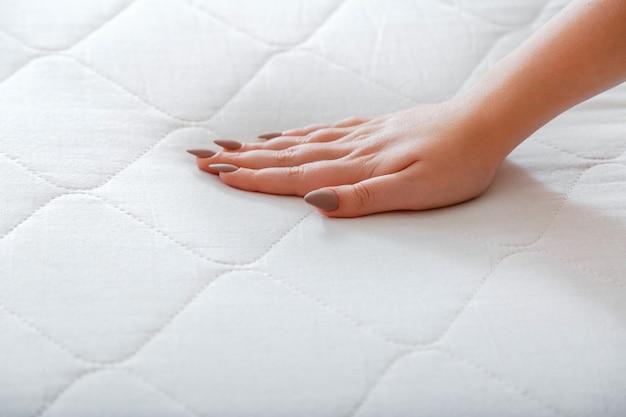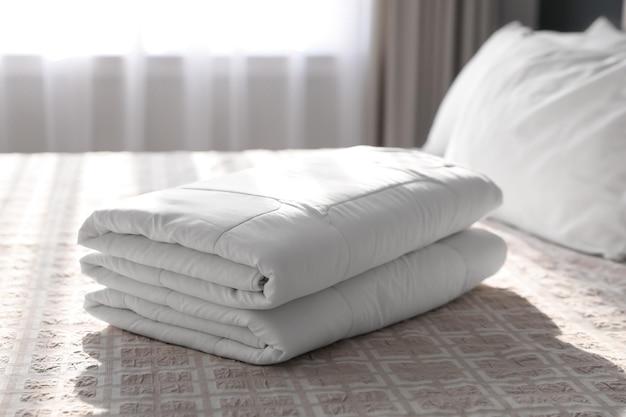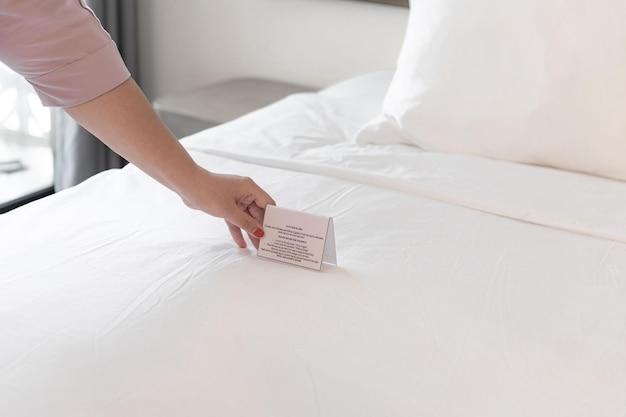Are you dealing with a wet mattress due to spilled water or a leaked water bottle? Perhaps you have a child who experiences bedwetting, or maybe you accidentally spilled water on your bed sheets. No matter the cause, a wet mattress is never a pleasant experience. It can be challenging to know the best way to handle the situation and prevent any damage to your mattress.
The first question that comes to mind is, “Is a mattress ruined if it gets wet?” We all know that water-soaked objects are never a good thing, but it’s natural to wonder if the same applies to your mattress. Don’t worry; the answer isn’t straightforward. It involves several factors, like the type of mattress, how much water was spilled, and how quickly you acted to dry it.
If you are dealing with spilled water on a memory foam mattress, you might be concerned about how to clean it. While memory foam may be comfortable and moldable to your body, it also absorbs water like a sponge. This situation can make it difficult to dry, leading to smells or mildew.
So what should you do if you inadvertently spill water on your bed or have a wet mattress from bedwetting? And what is the best way to dry a wet mattress quickly? All these questions will be answered in this comprehensive blog post. Keep reading to learn some easy-to-follow steps to help you deal with water spills on your mattress.
Dealing with Water Spilled on a Mattress
No matter how much we try to avoid it, accidents sometimes happen. If you’re anything like me, you might have worried about spilling water on your mattress, especially if you just bought a new one. It’s a situation we don’t want to be in, but it’s better to be prepared for when it happens.
How to Deal with a Wet Mattress
The first thing you want to do when you notice water spilled on your mattress is to remove all the sheets and covers immediately. Do this as quickly as possible, especially if the spill is substantial. Once you’ve removed all the bedding, assess the extent of the damage.
Drying the Mattress
If you have a ceiling fan or a standing fan, place it near the bed to help dry the mattress more quickly. If you have a humidifier, use it to help draw moisture out of the mattress. You can also use a hairdryer as long as it’s on the cool setting. Don’t use the hot setting as it can damage the mattress.
Another trick you can use to dry your mattress is to sprinkle some baking soda over the entire surface. Let it sit for a few hours, then vacuum it up, which will help to absorb any remaining moisture.
Dealing with Odors
Unfortunately, when water spills on a mattress, mold and mildew growth can occur. This can lead to unpleasant odors emanating from your bed. To eliminate odors, you can sprinkle baking soda over the surface of the mattress and leave it overnight. Vacuum up the baking soda in the morning. Alternatively, you can use a fabric deodorizer spray to get rid of unwanted odors.
Preventing Future Accidents
If you’re worried about future mishaps, consider using a mattress protector. A mattress protector is a waterproof cover that goes over your mattress. It can protect your mattress from spills, bedwetting, and other accidents. A mattress protector can be a valuable investment, especially if you have kids or pets.
Spilling water on your mattress is a situation many of us have faced. However, it’s not the end of the world, and there are steps you can take to deal with the problem. Follow the steps mentioned above, and your mattress will be as good as new in no time. Remember, it’s always a good idea to be prepared, so consider investing in a mattress protector to prevent future accidents.
Spilled Water on Bed Sheets
While a spilled glass of water on a mattress can be a frustrating experience, the situation can become more complicated if the water spills onto your bed sheets. Though it is a common experience, it can be challenging to handle, depending on the type of fabric your bed sheets are made of.
First Things First: Act Quickly
When you realize that water has spilled on your bed sheets, you must act fast. The longer the water stays on the fabric, the more difficult it will be to clean. It is essential to remove the bed sheets from the mattress and lay them out flat. This will prevent the water from seeping into the mattress or getting soaked up into areas of the sheets that were not affected by the spill.
Removing the Water
The next step is to remove as much water as possible from the bed sheets. You can do this by blotting the affected areas with a dry towel or cloth. Do not rub the fabric, as this can damage the fibers. You can also place a dry towel underneath the wet areas of the bed sheets. This will absorb the excess water and help speed up the drying process.
Drying the Bed Sheets
Once you have removed as much water as possible, you’ll need to dry the bed sheets fully. You can hang them outside on a clothesline or lay them flat on a clean, dry surface. It is important to avoid drying them under direct sunlight, as this can cause the fabric to fade or shrink.
Treating Stains
If the spilled water resulted in any stains on your bed sheets, you can treat them with a stain remover before washing. Be sure to follow the instructions on the label of the stain remover to avoid any damage to your bed sheets.
Spilling water on your bed sheets can be an annoying experience, but with quick thinking and the right approach, it is possible to effectively clean and dry them without causing any damage. Remember to act quickly, remove as much water as possible, dry the bed sheets completely, and treat any stains before washing. With these steps, your bed sheets will be as good as new!
Wet Mattress from Bed Wetting
If you have a child who tends to wet the bed, you know that accidents happen. Even if your child wears a diaper, there is still a chance that some urine can leak out onto the mattress. When this happens, it’s essential to clean it up as soon as possible to avoid damage to the mattress.
Materials Needed
Before you begin cleaning up the mess, it’s important to gather all the necessary materials. You’ll need:
- Clean towels
- Baking soda
- Hydrogen peroxide
- Dish soap
- Vacuum cleaner
Steps to Clean a Wet Mattress
- Remove all bedding and wash it in hot water to kill any bacteria and germs.
- Use clean towels to blot up as much of the liquid as possible.
- Liberally sprinkle baking soda all over the mattress and leave it there for several hours or overnight to absorb any remaining liquid and odors.
- Vacuum up the baking soda.
- Mix a solution of one-part hydrogen peroxide and two parts dish soap.
- Dip a clean cloth into the mixture, wring it out, and then blot the area where the urine was spilled.
- Rinse the cloth with water and blot the area again to remove any remaining soap residue.
- Allow the mattress to air dry completely before putting any bedding back on it.
Prevention Tips
To prevent bedwetting accidents from happening in the first place, you can try:
- Making sure your child uses the bathroom before going to bed.
- Limiting your child’s liquid intake before bedtime.
- Using protective mattress covers or waterproof sheets.
By being prepared for accidents and knowing how to clean them up properly, you can keep your child’s mattress clean and odor-free.
Water Bottle Leaked on Mattress
You’re just about to tuck in for the night after a long day, and then it happens. Your water bottle had been perched precariously on your bed-side table, and somehow, it falls over, spilling water all over your mattress. Before you let the panic set in, take a deep breath, and read on.
First Steps
The aftermath of a water bottle spilling on your mattress might look like a disaster. However, before you start hyperventilating, follow these tips to minimize the damage:
1. Get Rid of Excess Water
If the water is still pooled on the mattress, the first thing you need to do is extract the moisture. Wring out a towel, or use a clean dry towel to blot the water. Don’t rub, as this may push the water further into the mattress.
2. Check for Stains
Once you’ve removed all the excess water, check for any stains that may have formed. If the water bottle had any residue, such as sugar or salt, it could have caused discoloration on your mattress. If the stain is fresh, you might be able to remove it by blotting it with a solution of water and vinegar. If the stain is old, you might need to use a stronger cleaning solution or consult a professional mattress cleaner.
Drying the Mattress
To avoid mold, mildew, and unpleasant smells, it’s essential to dry your mattress thoroughly. Here’s what you can do:
1. Air it Out
If it’s sunny outside, it’s time to take your mattress out for a sunbath. Leave it to dry outside for a few hours, flipping it over so that both sides get some air. If it’s raining or snowing outside, it’s best to keep your mattress indoors but open your windows, turn on a fan, or use a dehumidifier to speed up the drying process.
2. Use a Dryer
If your mattress is small enough to fit into your dryer, you can use it to speed up the drying process. Place your mattress with a few clean towels to absorb any excess moisture. Alternatively, you could use a hairdryer on low heat, holding it about six inches away from the damp area, carefully moving it in circles.
3. Get a Specialist
If you don’t want to risk anything going wrong, it’s best to use the services of a professional mattress cleaner. They have specialized equipment to dry the mattress correctly and prevent any damage or mold growth.
Prevention is Better than Cure
Preaching aside, it’s essential to handle any spills on your mattress as soon as possible. Investing in a waterproof mattress protector is also a sensible option, mainly if you’re prone to accidents or have little ones in the house who tend to spill things.
How to Quickly Dry a Wet Mattress
Accidents happen, and sometimes water spills happen on the mattress, leaving it wet. It can be a worrying experience, but the good news is that you can easily dry a wet mattress fast without causing any damage. This article will cover some simple techniques to help you out.
Remove the Bedding
The first thing you need to do is remove all the bedding, including the mattress cover. This process will help you assess the severity of the damage and the degree of wetness. Don’t put any fresh bedding on until you’re sure that the mattress is completely dry.
Absorb the Water
Use a clean towel or rag to absorb as much water as possible from the mattress. Press down gently and allow the towel to soak up as much water as it can. Avoid rubbing or scrubbing as this could push water further into the mattress, making it harder to dry.
Use a Fan
Using a fan is one of the simplest and most effective ways to dry a wet mattress quickly. Aim the fan directly at the bed and turn it on to the highest setting. This action will help to circulate air over the mattress, which will help to evaporate the water.
Utilize a Hairdryer
A hairdryer is an excellent tool for drying a wet mattress quickly. Use the dryer on a low or medium setting, and aim it at the wet spots. Keep the dryer moving consistently over the areas to avoid overheating or damaging the mattress.
Try Baking Soda
Baking soda is an incredible natural absorbent that can help draw out any remaining moisture on the mattress. Sprinkle a generous amount of baking soda all over the mattress. Leave it for several hours before vacuuming it with your vacuum cleaner.
Sunlight
Sunlight is another fantastic way to dry out a wet mattress because it is a natural source of heat. Take the mattress outside and place it under direct sunlight, preferably on a raised surface. This method will help to dry out the mattress fast while killing any bacteria or mold on it.
In Conclusion
We hope that this section has helped you with tips on how to dry your wet mattress fast. Choose any of the methods above, depending on what’s available to you. Always remember to use gentle techniques to avoid damaging the mattress. If these methods don’t work, it may be time to get a new mattress.
Is a Mattress Ruined if it Gets Wet
You spilled water on your mattress, and now you’re wondering if it’s ruined. The short answer is no, not necessarily. Your mattress can get wet for a variety of reasons, such as spills or accidents, but the good news is that it doesn’t necessarily mean the end of your mattress’s lifespan.
How Much Water is Too Much
The amount of water spilled on your mattress will determine whether it can be salvaged. If you spill a small amount of water, you can dry it with a towel or let it air dry. However, if a significant amount of water has seeped into your mattress, then it may take longer to dry, and you may need to take some additional steps.
How to Salvage a Wet Mattress
To salvage a wet mattress, you need to dry it as soon as possible to prevent the growth of mold and mildew. Here are some steps you can take to save your mattress:
Step 1: Remove All Bedding
Remove all the bedding, including the sheets, pillows, mattress pad, and any other covers. This will allow air to circulate around the mattress and aid in the drying process.
Step 2: Absorb as Much Moisture as Possible
Use a towel or cloth to absorb as much moisture as possible from your mattress. Ensure to press down on the mattress, so the towel can soak up all the water.
Step 3: Let It Dry
After absorbing as much moisture as possible, let the mattress dry completely. You can place the mattress outside in the sun, leave it in a well-ventilated room or use a fan to speed up the drying process.
In summary, if you spill water on your mattress, don’t panic! Your mattress may not be ruined. You can save it by drying it as soon as possible. However, if the water has been on the mattress for an extended period, and it has begun to smell or has visible mold growth, it may be time to replace it. Remember, the key is to act quickly and dry the mattress as soon as possible.
Spilled Water on Memory Foam Mattress
Memory foam mattresses are known for their comfort and support, but they can be tricky to clean if you accidentally spill water on them. Here are some tips on how to handle the situation.
1. Act Fast
The longer the water sits on the mattress, the harder it will be to clean. So the first thing you need to do is act fast. Get some clean towels and start blotting the water out of the mattress. Don’t rub the area, as that can spread the water and make the stain worse.
2. Use a Fan or Hairdryer
After you’ve removed as much water as possible with towels, you can use a fan or hairdryer to dry the area. Just make sure you use the cool setting on the hairdryer, as high heat can damage the memory foam.
3. Use Baking Soda and Vinegar
If the water stain is still visible, you can try using a mixture of baking soda and vinegar to clean it. First, sprinkle baking soda over the affected area and let it sit for a few hours. Then, spray some vinegar on the baking soda and let it fizz. Finally, blot the area with a clean cloth and let it dry.
4. Use a Memory Foam Cleaner
If none of the above methods work, you can try using a memory foam cleaner specifically designed for memory foam mattresses. Just be sure to follow the manufacturer’s instructions carefully.
Spilling water on a memory foam mattress may seem like a disaster, but it’s not the end of the world. With a little bit of quick thinking and some simple cleaning techniques, you can make your mattress look and feel like new again. Just remember to act fast, use a fan or hairdryer, and try some baking soda and vinegar or a memory foam cleaner if necessary.
How to Dry a Mattress After Bedwetting
Accidents happen, and if you or your child has wet the bed, you may be wondering how to dry a mattress properly. Here are some steps you can follow to prevent permanent damage to your mattress:
Step 1: Remove the Soaked Sheets and Blankets
As soon as you discover the dampness, remove all the wet sheets and blankets from the bed. Be cautious not to spill the liquid all over the floor or other areas of your house.
Step 2: Blot the Affected Area
Using a clean towel, gently blot the affected area to absorb as much moisture as possible. Avoid rubbing the stain vigorously as it may push the liquid further into the mattress’s fibers.
Step 3: Use Absorbent Materials
If the liquid is still present on the mattress, you can use some absorbent materials like baking soda, cornstarch, or talcum powder to sprinkle the stained area. Allow the powder to rest on the stain for several hours.
Step 4: Vacuum the Moisture
After waiting for several hours, vacuum the dry powder off the mattress. Use the low suction setting on the vacuum cleaner to avoid damaging the mattress fibers.
Step 5: Air Dry the Mattress
If possible, place the mattress outside in a well-ventilated area or use a fan to increase airflow. You can also use a hairdryer or a fan on the cool setting to speed up the drying process.
Step 6: Use a Mattress Protector
Prevention is always better than cure, and using a waterproof mattress protector can save you from the stress and expense of cleaning and drying the mattress. A protector can also keep away stains and odors, making cleaning easier.
In conclusion, when water spilled on mattress, drying it is crucial to prevent mold growth and damage to the mattress structure. Follow these steps to dry your mattress thoroughly and eliminate any odor. A clean and dry mattress, free from any stains, is vital for a good night’s sleep.
What Do I Do If I Spilled Water on My Bed
Sleeping on a wet mattress can be quite uncomfortable. Whether you spilled water on your bed or your child had an accident, dealing with a wet mattress can be a bit challenging. In this section, we will take a look at some tips on what to do when you accidentally spill water on your bed.
Absorb As Much Water As Possible
The first thing you need to do is to absorb as much water as possible from the affected area. You can use a dry towel, a sponge, or even a vacuum cleaner to get rid of the water. Remember, it is crucial not to rub the area, as this will spread the water and make things worse.
Use Baking Soda
Baking soda is known to be effective in removing moisture and odor from surfaces. Sprinkle a generous amount of baking soda onto the wet spot and let it sit for several hours. Afterward, vacuum up the baking soda residue with a clean, dry vacuum.
Air-Dry the Mattress
After you have absorbed most of the water, leave the mattress to air-dry. It is essential to ensure there is proper ventilation in the room to speed up the drying process. You can place a fan beside the bed or use a dehumidifier to get rid of any excess moisture.
Flip the Mattress
If possible, flip the mattress to the other side to allow the wet part to dry completely. Remember to continue with the drying process until the mattress is free from any moisture.
In conclusion, spilling water on your bed is not the end of the world. With the tips above, you can easily restore your mattress to its original condition. However, if the situation is more severe than a simple water spill, you may need to consider getting a new mattress.
What Happens If You Spill Water on Your Mattress
Waking up to see water spilled on your bed can ruin your day before it even starts. Whether it’s from a leaky water bottle or an overflowing glass, the question remains: what happens to your mattress when it gets wet? Here’s what you need to know:
Will the Stain Disappear
Unfortunately, the answer is usually no. Even after drying the mattress, a water stain can remain visible, leaving an unsightly mark on your bed. Depending on the fabric and the color of your mattress, the stain can range from barely noticeable to a glaring reminder of your accident.
Can My Mattress Get Damaged
Yes, water can damage your mattress. If not adequately dried or left wet for an extended period, the mattress can develop mold, mildew, or even bacteria. These microorganisms can cause health problems and affect the lifespan of your mattress. Additionally, water can weaken the structure of the mattress, leading to sagging or even collapse.
How Can I Safely Clean My Mattress
The first step is to remove any excess water using a towel or a dry cloth. Afterward, sprinkle baking soda on the wet spot and allow it to sit for several hours to absorb any remaining moisture and odor. Vacuum the area and then use a damp cloth to gently clean the stained area, being careful not to saturate the mattress. Finally, use a fan or a hairdryer on a cool setting to dry the mattress completely.
What Can I Do to Prevent Water Damage to My Mattress
The best way to prevent water damage to your mattress is to avoid spilling water in the first place. If you like to drink water in bed, consider using a leak-proof water bottle instead of a glass. Protecting your mattress with a waterproof mattress protector can also help prevent water damage and increase the durability of your mattress.
Remember, accidents happen, and spills are a part of life. But with quick action and some basic cleaning techniques, you can prevent water damage and keep your mattress looking and feeling its best.



